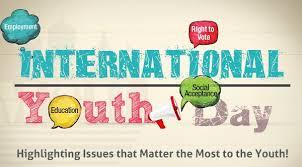
https://www.un.org/en/events/youthday/
There are currently 1.8 billion young people between the ages of 10 and 24 in the world. This is the largest youth population ever. However, more than half of all children and adolescents aged 6-14 lack basic reading and maths skills, despite the fact that the majority of them are attending school. This global learning crisis threatens to severely hamper progress towards the SDGs.
12 August was first designated International Youth Day by the UN General Assembly in 1999, and serves as an annual celebration of the role of young women and men as essential partners in change, and an opportunity to raise awareness of challenges and problems facing the world’s youth.
2019 Theme: “Transforming education”
This year’s theme highlights efforts to make education more inclusive and accessible for all youth, including efforts by youth themselves. Rooted in Goal 4 of the 2030 Agenda for Sustainable Development – to “ensure inclusive and equitable quality education and promote lifelong learning opportunities for all” – International Youth Day 2019 will examine how Governments, young people and youth-led and youth-focused organizations, as well as other stakeholders, are transforming education so that it becomes a powerful tool to achieve the 2030 Agenda for Sustainable Development.
Inclusive and accessible education is crucial to achieving sustainable development and can play a role in the prevention of conflict. Indeed, education is a ‘development multiplier’ as it plays a pivotal role in accelerating progress across all 17 Sustainable Development Goals, be it poverty eradication, good health, gender equality, decent work and growth, reduced inequalities, action on climate or peaceful societies. Education should lead to relevant and effective learning outcomes, with the content of school curricula being fit for purpose, not only for the 4th industrial revolution and the future of work, but also for the opportunities – and challenges – that rapidly changing social contexts bring.
The crucial role that quality education plays in youth development is well recognized. In addition, comprehensive youth development benefits society-at-large. However, what is less known is the fact that young people themselves are active champions of inclusive and accessible education. Youth-led organizations, as well as individual youth, together with various stakeholders and Governments, are concretely transforming education so that it becomes a fundamental tool both for sustainable development and for the full inclusion of various social groups. For example, youth-led organizations are transforming education via lobbying and advocacy, partnerships with educational institutions, the development of complementary training programs, etc.
Spread the Word and Connect with Us!
Ahead of the International Youth Day, UN DESA, in collaboration with UNESCO, will be calling for a transformation of our education systems to make them more inclusive, equitable and relevant for the 21st century realities. We would greatly appreciate your help in amplifying this call, using:
- Trello board: https://trello.com/b/IrJs1l63
- Hashtags: #YouthDay #TransformingEducation #SDG4
- Accounts to follow:
- Twitter: @UN4Youth, @UNDESA
- Facebook: @UN4Youth, @joinundesa, @UNESCOyouth
Why do we mark International Days?
International days are occasions to educate the public on issues of concern, to mobilize political will and resources to address global problems, and to celebrate and reinforce achievements of humanity. The existence of international days predates the establishment of the United Nations, but the UN has embraced them as a powerful advocacy tool. More information available here.











Add new comment